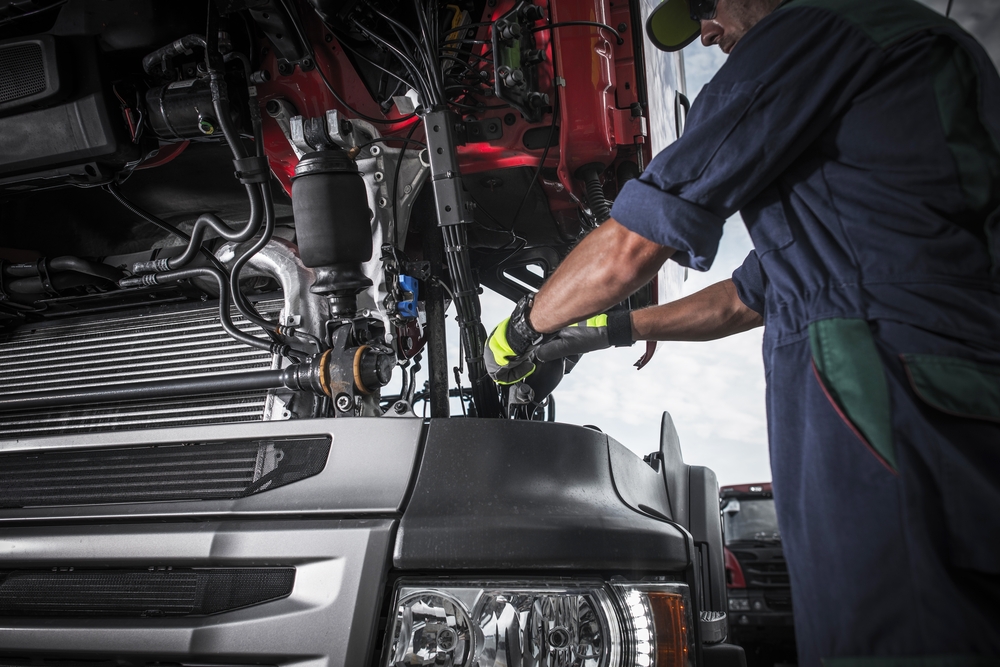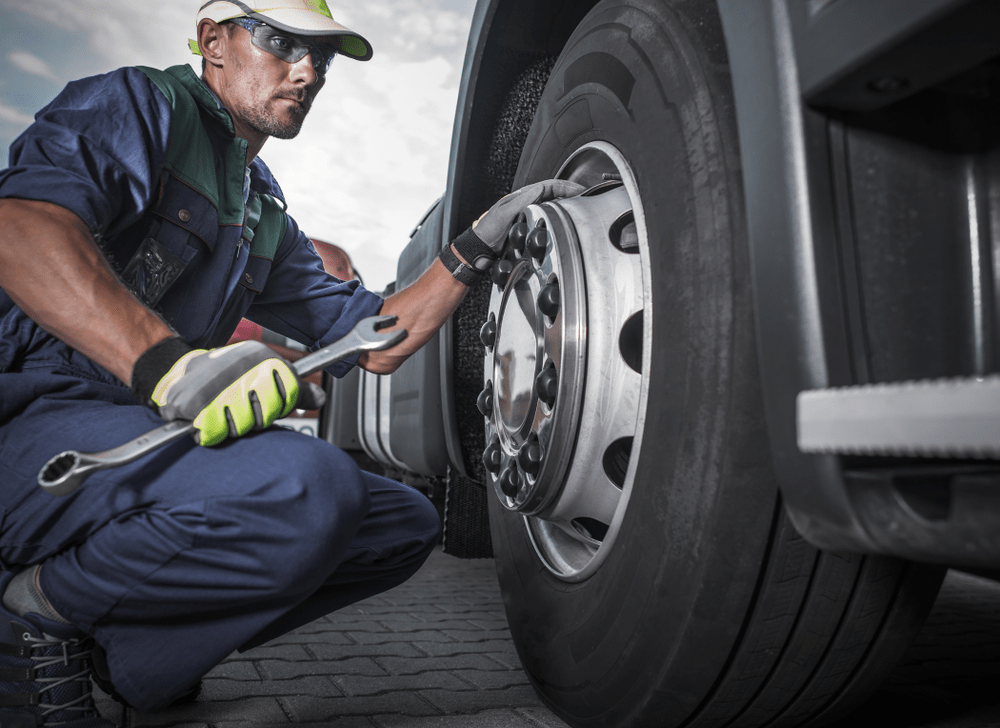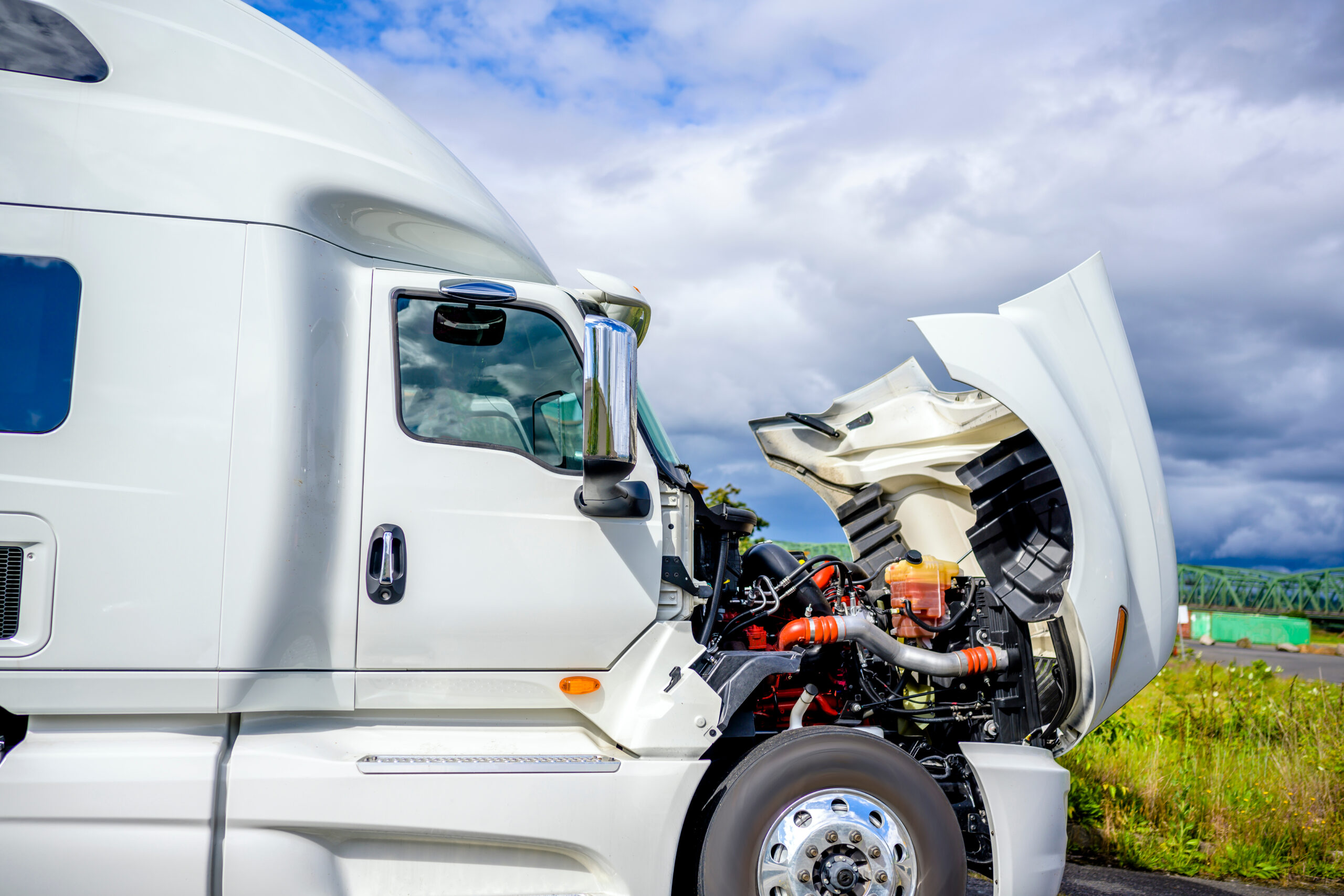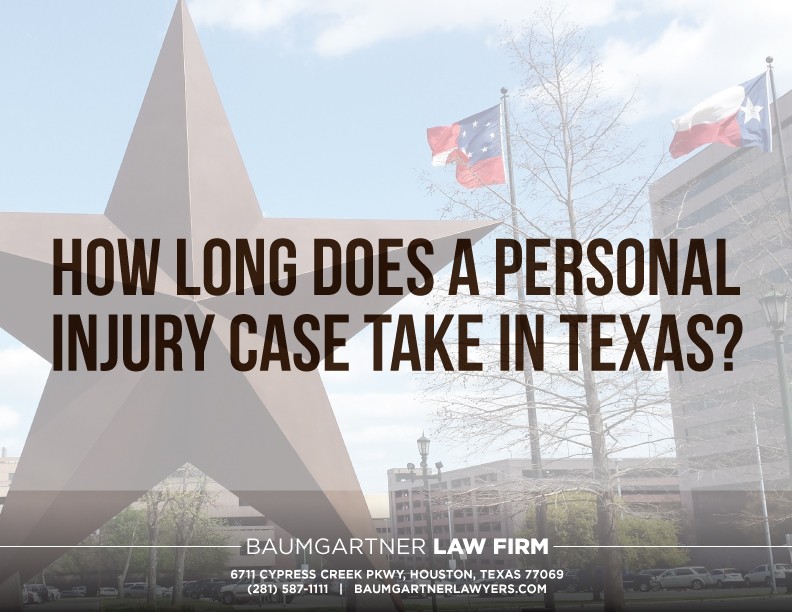As drivers on the road in Texas, we will likely be near a big rig during our travels. Houston is a major truck transportation hub, so it is no surprise that we have to share the road with huge commercial vehicles. Unfortunately, we also have to worry about truck accidents, especially those with mechanical failures. Some types of mechanical failures are more common than others.

18-Wheeler Truck Accident Causes
The Federal Motor Carrier Safety Administration (FMCSA) gathers accident data from various sources and publishes annual reports. The most recent report shows that more than 4,200 fatal truck accidents occurred. That number is about the same as it has been for the last several years. Information on the number of big rig accidents is shocking. Safety must become a priority for trucking companies to prevent crashes.
According to a study completed by the University of Michigan Transportation Research Institute (UMTRI), more than half of the trucks involved in accidents had some mechanical failure at the time of the crash.
About 30% of trucks had a mechanical failure that should have kept them off the road in the first place. A dangerous semi-truck or 18-wheeler must be placed “out-of-service” until the condition has been fixed.
Common Mechanical Failures of Big Rigs
18-wheelers are more complicated than standard passenger vehicles and have more complex maintenance systems. For that reason, truck safety can’t be discounted. Some of the most common mechanical failures of big rigs include the following.
Tire Failures
Tire-related issues are another common factor in truck accidents. When a tire suddenly blows out, the truck driver may lose control of the vehicle, resulting in dangerous situations for the truck driver and other drivers. Factors such as overloading, tire quality, and pressure can lead to tire failure in 18-wheelers. By understanding the factors contributing to tire failure and implementing preventative measures, truck drivers and companies can reduce the risk of tire-related issues and the accidents they cause.

Factors Contributing to Tire Failure
Several factors can contribute to tire failure in 18-wheelers. Overloading the truck, for example, can accelerate tire wear and increase the risk of a blowout. Tire quality also plays a crucial role in tire longevity; low-quality tires are more susceptible to blowouts and other issues. Inadequate tire pressure can also lead to tire failure, as overinflated or underinflated tires are more susceptible to punctures and blowouts.
Aside from these factors, inadequate maintenance, such as failing to regularly inspect tires for damage, can also contribute to tire failure. By addressing these contributing factors, truck drivers and companies can reduce the risk of tire-related issues and improve overall truck safety.
Preventative Measures for Tire Safety
Several factors can contribute to tire failure in 18-wheelers. Overloading the truck, for example, can accelerate tire wear and increase the blowout risk. Tire quality also plays a crucial role in tire longevity; low-quality tires are more susceptible to blowouts and other issues. Inadequate tire pressure can also lead to tire failure, as overinflated or underinflated tires are more susceptible to punctures and blowouts.
Aside from these factors, inadequate maintenance, such as failing to regularly inspect tires for damage, can also contribute to tire failure. By addressing these contributing factors, truck drivers and companies can reduce the risk of tire-related issues and improve overall truck safety.
Brake System Failures
One of the most critical components of an 18-wheeler is its braking system. Brakes ensure the truck and other drivers’ safety when functioning properly. However, brake system failures in 18-wheelers can be caused by inadequate maintenance, defective components, or improper driving practices. The consequences of brake failure in these massive vehicles can be dire. The loss of control of the vehicle and the potential for serious accidents can put everyone on the road at risk.
Brake Malfunction Causes
Identifying the root cause of brake malfunctions is essential to preventing future accidents. Inadequate maintenance, for example, can lead to worn brake pads or corroded brake lines, ultimately resulting in brake failure. Defective components are another common cause of malfunction. For instance, a faulty master cylinder or a leaking brake caliper can compromise the braking system’s effectiveness.
Incorrect driving techniques, such as aggressive braking or failing to allow brakes to cool after extended use, can also contribute to brake system issues. Regular maintenance and awareness of these potential causes can help drivers and trucking companies minimize the risk of brake failure, thereby ensuring the safety of truck drivers and other road users.
Consequences of Brake Failure
The consequences of brake failure in 18-wheelers can be catastrophic. When a truck’s brakes fail, the driver may lose control of the vehicle, leading to serious accidents such as jackknife accidents, truck rollovers, and runaway truck collisions. These accidents put the truck driver’s life at risk and endanger the lives of other drivers and passengers.
Given the size and weight of big rigs, the force of impact in accidents involving brake failure can result in severe property damage, injuries, and even fatalities. Truck drivers and trucking companies must prioritize brake maintenance and adhere to proper driving techniques to minimize the likelihood of brake failure and its devastating consequences.
Lighting and Visibility
Operational lights are essential for truck drivers to observe their surroundings and for others to detect the truck, particularly in low-light conditions or inclement weather. However, lighting system failures, such as headlight, taillight, and side light malfunctions, can compromise visibility and increase the risk of accidents.
Ensuring proper lighting and compliance with regulations can significantly improve truck safety and reduce the likelihood of accidents caused by poor visibility.
Common Lighting System Failures
Various types of lighting system failures can occur in 18-wheelers. Headlight malfunctions, for example, can result from defective components such as fuses, relays, or modules or from excessive resistance in the circuit. Taillight, side lights, and signal malfunctions are common and can be caused by faulty wiring, damaged bulbs, or other issues.
Regular inspections and maintenance of lighting systems can help identify and address these issues before they become safety hazards. Truck drivers and companies can enhance visibility and mitigate the risk of accidents by ensuring all lights function properly.
Impact of Lighting Failure on Safety
Inadequate lighting on 18-wheelers poses a significant safety risk to drivers, passengers, and pedestrians. When other drivers cannot anticipate a truck’s next move due to malfunctioning turn signals or side lights, collisions increase even during daylight hours.
Furthermore, reduced visibility in low-light conditions or inclement weather can make it difficult for truck drivers to see and react to obstacles in their path, potentially leading to accidents.
By ensuring proper lighting and compliance with regulations, truck drivers and companies can minimize the risk of accidents caused by lighting failure and promote a safer driving environment for all.
Engine Breakdown and Transmission Issues
Transmission and engine complications can cause accidents if not properly maintained. When a truck’s transmission or engine fails, the driver may be stranded on the side of the road, posing a danger to themselves and other road users. In such situations, truck drivers should place flares or warning markers behind the truck to alert other drivers of its stalled condition.
Truck drivers and companies can prevent transmission and engine complications by following regular maintenance practices and running their trucks smoothly.
Causes of Transmission and Engine Failure
Insufficient maintenance is the primary cause of transmission and engine failure in 18-wheelers. Overloading or incorrect cargo loading can also contribute to transmission failure, as the added weight puts excessive strain on the transmission system.
Regular maintenance, including checking and replacing fluids, filters, and belts, is essential to prevent transmission and engine failure and ensure the truck’s smooth operation. By addressing these causes and implementing proper maintenance practices, truck drivers and companies can minimize the risk of transmission and engine issues, thereby improving overall truck safety.
Consequences of Transmission and Engine Issues
The consequences of transmission and engine issues in 18-wheelers can include accidents, overheating, and transmission failure, resulting in breakdowns and delays for truck drivers. In addition to the inconvenience and potential financial losses associated with breakdowns, a malfunctioning transmission or engine can also put the truck driver and other road users at risk of accidents.
Regular maintenance and proper loading practices can help prevent transmission and engine issues, reducing the risk of accidents and ensuring smoother truck operation.
Steering and Suspension Problems
Steering and suspension problems in 18-wheelers can lead to erratic driving, increased stopping distance, and a higher risk of accidents. Overloading your cargo can cause steering and suspension failure. Poor driving techniques and inadequate or infrequent maintenance can cause the same problem.
By understanding these causes and implementing regular maintenance, drivers and trucking companies can prevent steering and suspension issues, keeping their trucks running smoothly and safely.
Causes of Steering and Suspension Failure
Overloaded cargo can place excessive strain on the steering components of an 18-wheeler, potentially leading to steering failure. Improper driving techniques, such as taking turns too fast or making sudden lane changes, can also put added stress on the steering system and lead to failure. Inadequate or infrequent maintenance can lead to worn or damaged components, which can, in turn, result in steering failure.
Truck drivers and companies should ensure proper cargo loading, maintain appropriate driving techniques, and adhere to a regular maintenance schedule to prevent steering and suspension issues. By doing so, they can minimize the risk of steering and suspension failures, thereby enhancing overall truck safety.
Effects of Steering and Suspension Issues
The effects of steering and suspension issues in tractor-trailers can range from difficulty steering and excessive bouncing after driving over bumps or potholes to uneven tire wear and instability at high speeds. These issues can lead to unpredictable driving behavior, putting both the truck driver and other road users at risk of collisions.
By addressing the causes of steering and suspension issues and implementing proper maintenance practices, truck drivers and companies can mitigate these risks and promote safer driving conditions.
Truck Crash Liability Related to Mechanical Failures of Big Rigs
When mechanical failures result in truck accidents, determining liability can be a complex process. Depending on the specific circumstances, the driver, trucking company, manufacturer, or other parties may be liable for the accident.
Hiring an attorney experienced in negligent maintenance claims to represent your interests and help you navigate the legal process is essential in such cases.
Potential Liable Parties
The truck driver, the trucking company, the manufacturer of the truck or its parts, and the maintenance provider could all be held liable for mechanical failures in 18-wheelers. The driver is responsible for ensuring that the truck is in good working order and for adhering to all safety regulations.
On the other hand, the trucking company is responsible for providing the driver with a safe and reliable vehicle and adhering to all safety protocols. The manufacturer is responsible for producing a safe and reliable vehicle. At the same time, the maintenance provider must ensure the truck is in proper working order.
In mechanical failure cases, determining liability can be a complex process, requiring the expertise of an experienced attorney who can help injured individuals obtain the rightful compensation for their losses.
Importance of Expert Legal Representation
In cases involving mechanical failures in 18-wheelers, legal representation is crucial for protecting the interests of injured individuals and helping them obtain the compensation they deserve. An experienced attorney can investigate the accident, determine whether the trucking company fulfilled its maintenance obligations, and identify any parties that may be held liable for the accident.
By seeking the assistance of an experienced 18-wheeler accident attorney, individuals injured in such accidents can navigate the legal process, hold the responsible parties accountable, and recover compensation for their losses.
Our Investigation of Truck Wrecks
Investigation of a truck accident that includes serious injury or a fatality is needed to discover all the causes of the crash. Often, it is only after a detailed analysis of the tractor and trailer’s condition and a review of the evidence that some facts come to light. Our 18-wheeler investigation team has won every case we have taken on after a wrongful death or injury truck crash.
For over 35 years, we have been undefeated in trucking accident litigation.
We have won many cases where we have proven the 18-wheeler was in a dangerous condition and the cause of the wreck. Even representing commercial truck drivers who have been injured in accidents. Call our skilled truck accident attorneys for a consultation about your case.
Examples of Baumgartner Law Firm Truck Accident Cases with Mechanical Failures
We have over 35 years of expertise in winning truck accident injury lawsuits at Baumgartner Law Firm. Here are a few examples of cases we have won that involved a mechanical failure as a cause of the crash.
The Truck Broke Down and Got Hit from the Rear.
We represented a family in a wrongful death case against a trucking company whose rig broke down due to engine trouble. After filing a lawsuit and conducting discovery, we learned the truck was improperly parked and maintained. The defendants settled for a confidential amount before trial.
Faulty Brakes Caused a Jackknife Crash
We represented a truck driver badly injured in an accident where his truck jackknifed across the road, killing two innocent people in a car. After taking numerous depositions, we learned that the tractor had faulty brakes, which contributed to the accident.
We sued the maintenance company and the motor carrier. We recovered millions of dollars for our client and more money than the other “truck accident lawyers” got for the families of the two innocent victims killed in the wreck.
Rear-End Truck Accident Caused by Bad Brakes
A trucker was unable to brake in time and slammed into our client. We proved the brakes were faulty, and the crash could have been avoided if the brakes had been properly operating. After numerous depositions and an exhaustive investigation, the trucking company settled for a multi-million-dollar amount.
Talk With a Leading Big Rig Accident Lawyer In Houston, TX
Truck drivers and trucking companies must inspect and maintain their vehicles. If they do not do so, they could be negligent. Improperly maintained big trucks should not be on the road.
If you were involved in an accident with a big rig, our Truck accident lawyers in Houston could help. Contact our experienced Houston legal team at Baumgartner Law Firm to schedule a consultation today. We will advocate for your rights and secure the compensation you deserve for your injuries.
6711 Cypress Creek Pkwy, Houston, TX, 77069
(281) 587-1111













